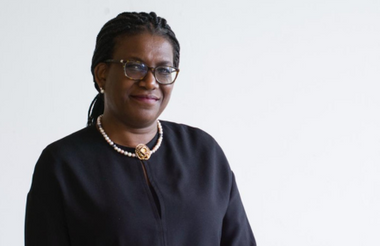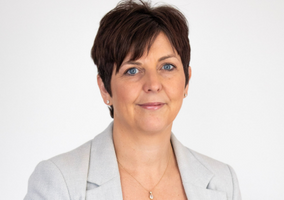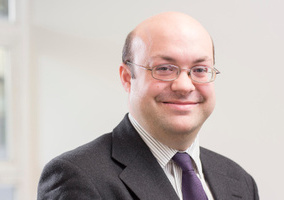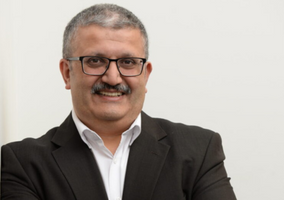Black Equity Organisation (BEO) will celebrate its second anniversary this month, having launched to promote economic, legal, social and political equity for Black communities in Britain.
Timi Okuwa has been involved with the charity since 2022, when she joined as its director of partnerships and programmes.
Last year, she became its interim chief executive for eight months before taking up the role permanently in December 2023.
Okuwa was born in the UK and also grew up in Nigeria “so experienced the aftermath of colonialism, the arbitrary borders and boundaries that were set and still impact not just Nigeria, but Africa”.
She says studying US authors such as James Baldwin, Toni Morrison and Alice Walker also contributed to her passion for social justice.
“I wrote my dissertation about the experience of Black African American writers in the US and was always very curious about not just about colonialism, but also the transatlantic slave trade, because again, there are references to that in Nigeria.
“And I’ve always been somebody that believes in fairness and justice.”
Okuwa worked for a number of years in both the public and private sectors, and then “wanted to do work that was more aligned to my purpose and things that I cared about”.
“If you ever got me into a room where we’d be arguing about something and it came to race everybody was like ‘that’s Timi’s thing’.
“So, finding out that an organisation like BEO was here to do that, for me that just felt like it was aligned to my values and to my mission.”
‘Transformative’ Black Lives Matter movement
BEO was set up after the Black Lives Matter (BLM) movement gained greater prominence in 2020 following the murder of George Floyd.
It registered as a charity in 2021, with trustees including Labour MP David Lammy and business leader Vivian Hunt, before officially launching in May 2022.
Okuwa says the BLM protests were “transformative” and a “unique moment in time”.
“Everybody then had to look and say: ‘What role am I playing in enforcing or maintaining this systemic racism within different spaces?’
“Protests are really helpful and they amplify it so that everybody sees it. People who aren’t interested necessarily in social justice all of a sudden are thinking: ‘What’s going on in Bristol? Why are people throwing that statue?’”
BEO has secured long-term funding from organisations such as Lankelly Chase, and Okuwa says the BLM movement led to many funders looking at the work that they funded and whether they are funding “not performatively, but in a way that can actually affect long-term change”.
Okuwa says the response to BLM was “transformative”, though adds the work needs to persist.
“It’s about making sure that that’s not just a moment in time, and making sure that we continue to make sure that that energy that we saw at that time is still mobilising and still pushing organisations, governments, corporates, communities, funders, all sorts of people that can make a change.
“It’s not just for one party to make change. You do need to have that consistent group of people who can affect change within a system, to continue to work together to do that.”
‘You can go much further when you work with others’
When living in Hackney, north-east London, with her family, Okuwa recalls people using racial slurs.
Okuwa says she wants BEO to make change for individuals, but also to focus its work on dismantling institutional and systemic racism.
“An organisation like BEO is not just here to ensure that there’s inclusion and reduce those kinds of one-to-one interactions, but it’s actually the institutional and the systemic racism that’s embedded within organisations, embedded within policies and so on, that is therefore then the experience not just of an individual Black person, but more generally.”
Okuwa says there is “power in a collective voice” and would like to see more collaboration between organisations in the sector and outside. For example, BEO and Sky have a £1m partnership, supporting Black British entrepreneurs.
BEO is also working with campaigning organisation Operation Black Vote on a project to create Black Britain’s Mandate, which will include priorities for the next government based on suggestions from Black people of Caribbean and African heritage living in the UK.
“We do work in partnership. I’m very, very passionate about this. I’ve been married for a very long time, and I know that you can go far on your own but you can go much further when you work with others.
“And so, one of the biggest aims for BEO is strategic convening, bringing together lots of different organisations who are doing this work and have been around before we even came here.”
Importance of inclusion
Okuwa says equity is important as an “acknowledgement that we’re not all starting from the same place”.
“But inclusion for me is just as important because if I’m feeling psychologically safe in certain spaces, it means that I can then show up as myself.”
Okuwa worked in professional services firms, and sometimes felt pressure to speak up as the only Black person in the room.
“You see something and think: ‘Woah, what’s that about?’ So you feel like you have to speak up and be that person. But it can be quite draining to continue to do that because you’re doing that in addition to your work.”
Okuwa says she would like to see organisations mandated to report their ethnicity pay gaps in the same way that those with more than 250 employees currently do so for their gender pay gaps.
Where organisations have succeeded in reducing gaps, Okuwa says other organisations can learn from their interventions – such as EDI strategies, retention rates, and progression opportunities.
“If you do want to have diversity in your organisation, it’s got to be mixed with learning from what other organisations have been doing to address these issues.”
‘We’ve had a startup mentality’
As a fairly new charity, Okuwa says BEO has had a “startup mentality” which means they are “building something from the ground up, of boldness and resilience”.
This means there has to be “flexibility and adaptability” in the work BEO does, she says, but the charity has “a clear strategy in place for the next few years”.
Its Dismantling Systemic Racism strategy is long-term but the first three years are focussed on raising awareness of systemic racism, highlighting how it impacts Black communities, as well as ensuring Black communities know their rights and use their power to hold institutions to account.
Two years in, BEO is “now in a strong place” and part of this is due to having funders “committed” to supporting the organisation.
The CEO says having a strong team is just as important as having long-term funders who can make sure “that the work that we’re here to do, can be consistent”.
BEO received money from individuals, foundations and key partners at its launch, which has since continued.
The charity now has a range of donors and funders which have extended multi-year, unrestricted and core funding to BEO.
Indeed, in the year to March 2023, its income grew five-fold to £2.78m, up from £579,000 the year prior.
On her ambitions for the charity, Okuwa says: “I want BEO to be seen as one of the main voices for Black Britain, for Black communities in the UK; that we are seen as an organisation that partners want to work with, allies want to work with, policymakers want to work with.”
Okuwa emphasises that BEO is an apolitical, nonpartisan organisation that is also “data driven and insights driven”.
“All of the projects that we’re doing are here to make sure that we can make that systemic change and make sure that we’re here for the long-term.
“I’m very keen to make sure that we are seen as an organisation that raises awareness of Black people’s rights so that they know their power.”
Related Articles












